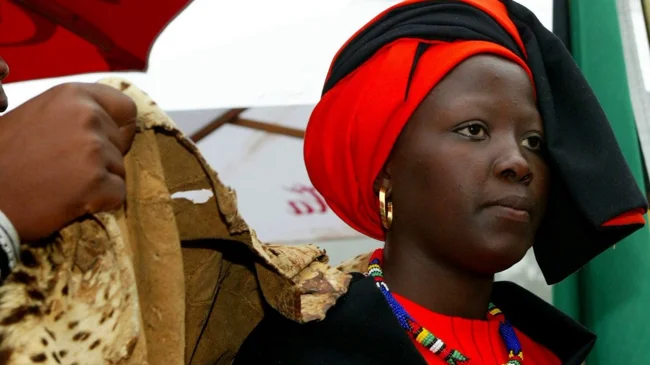Mistress of the Rainstorms Secrets of the African Rain Queen (8 photos)
After the abdication of the Queen of the Netherlands and the death of Elizabeth II, only one queen regnant remained in the world—Margrethe II of Denmark. But few Europeans know that in Africa, for five centuries, a dynasty of queens has reigned supreme. In addition to ruling over their people, they also wield the powers of the heavens, able to summon rain. 
Rain Queen Modjadji VII
There's nothing surprising about rainmakers themselves—such positions exist in many African tribes. But only among the Lobedu people does a woman—the current queen—commune with the elements. Her authority over the sky is recognized by other peoples, and her title is confirmed by the official authorities of South Africa. Unique in all of Africa, the Rain Queen is considered the continent's most mysterious and secretive ruler, whose face only a few can behold.
Or rather, this was believed, for modern progress has reached the most remote corners of the Limpopo province, and today's Rain Queen no longer conceals her face, although she still possesses the powerful power to summon downpours. However, the ruler is not yet allowed to use it. And here's why.
About Chiefs and Rain
The Rain Queen dynasty has ruled the small Lobedu people, who live in the picturesque valleys and foothills of the Drakensberg Mountains in the northern Transvaal, for five centuries. Initially, the tribe was no different from its neighbors—it had a chieftain and a powerful rainmaker. But in the 16th century, the ancestral spirits whispered to the aging chieftain that he should have intercourse with his own daughter, in order to produce a powerful and unprecedentedly strong girl capable of controlling the weather. This is what happened, and a summoner of the elements was born, named Modjadji, meaning "ruler of the day." After the death of her father and the tribe's shaman, she became the leader of the Lobedu people, and her heirs assumed the title of Rain Queen in 1800, a title they hold to this day. 
Boys of the Lobedu people during an initiation rite
The transition from a patriarchal to a matriarchal system was not easy for the tribe—for almost three hundred years, the Modjadji hid their faces and appeared before their subjects exclusively in men's clothing with a tight veil over their heads, something like a Central Asian chador. But the queens only had to do this a few times a year, when the dry season began and they needed help communicating with the elements. The rest of the year, the rulers lived in extreme seclusion, interacting only with a select few. No one in the tribe witnessed the rain-making ceremony itself, and the details are unknown to the modern tribe. Rumors circulate, one more outlandish than the other: about using the ashes of the previous queen to summon rain, and about terrifying amulets made from the skulls of enemies and drums made from their skins. But these are just rumors, as Modjadji performs rain-summoning alone, and her amulets are guarded no less carefully than the royal kraal. Incidentally, it is surrounded by a wonderful, lush garden that never dries up even during the most severe droughts. Nothing surprising—it is, after all, the residence of the Rain Queen. 
The Rain Queen's Garden is considered the world's largest cycad plantation (a special type of palm).
In the 17th and 18th centuries, Modjadji's power grew so strong that the previously unknown Lobedu people became the talk of South Africa. Delegations from other tribes flocked to the queen with generous gifts. None of them were allowed to see the queen of the elements; the petitioners were only allowed to beg her for favors from a respectful distance from the walls of her kraal. Modjadji might hear them, or she might not; she might condescend to their requests, or she might become angry at their meager gifts. In the latter case, she was content to do nothing, and the life-giving moisture from the sky would pass by, condemning the petitioners to hunger and poverty. In the 19th century, the African peoples of southern Africa were forced to integrate into the state structures of the incoming Europeans. First, it was the Boer Republic of Transvaal, then the Union of South Africa, and then South Africa. And despite the change of governments, the authority of the Rain Queen was always recognized by the official authorities. Almost a century and a half has passed since then, and many peoples of the southern continent have lost their national identity, their chiefs, rulers, and shamans have vanished into the past. But among the Lobedu, as five centuries ago, Queen Modjadji continues to rule, now the seventh. 
Preparing for the rainmaking ceremony at the Queen's residence, 2001
The Queen's Wives
The succession process should be completely clear and logical—from mother to daughter. But it wasn't! Among the Lobedu, it's so exotic and outlandish that one can only sympathize with the queen. Poor woman, she's forced to take a vow of celibacy and consciously renounce motherhood. But what about the heir? It's both simple and complex. Ever since the days when Modjadji hid her face from her subjects and appeared in public in men's clothing, a tradition of royal wives has arisen. Not husbands, but wives, of whom the queen had a whole harem. No sexual deviations—the Rain Queen's wives were considered something like ladies-in-waiting. But unlike the ruler, they had no restrictions on contact with the opposite sex. However, such contact could only occur with Modjadji's close male relatives. Thus, children were born, from which the Rain Queen chose her heir. 
The Rain Queen's wives before the rainmaking ceremony, 2001
The transfer of the most sacred possessions—the rainmaking ritual and magical amulets—took place when the current queen was already on her deathbed. Previously, the tribe believed that after the transfer of divine power, the heir must give the "mother" a bowl of plant poison. And that rule required her to drink the poison without complaint. This is how Modjadji II and Modjadji III passed away. This no longer happens, but the traditions of succession remain unchanged, only slightly modernized. After Modjadji V, the institution of royal wives became a thing of the past, and the sovereign began appointing the daughter of one of her male relatives as her heir. In fact, the fifth Rain Queen was a true traditionalist—she lived a very secluded life, strictly adhered to ancient customs, and was known as the most skilled rainmaker in all of southern Africa. She had a "daughter," the official heir, who was preparing to become the new queen. However, in 2001, the irreparable happened—Princess Maheala died suddenly of an unknown illness. Two days later, unable to bear the grief, Modjadji V also departed this world at the age of 65. 
The Lobedu Royal Family
For the first time in history, the Lobedu royal family was beset by a dynastic crisis: the Rain Queen died without an official heir to whom she could pass on her most important secret—the rainmaking rituals. The brothers and uncles of the deceased ruler were forced to appoint a new ruler. This new ruler was Modjadji V's granddaughter, Makobo, who took the title Modjadji VI. The only problem was that the new queen had no desire to live secluded within the walls of her kraal, communicating with no one and performing rituals she had no idea about. She became the most modern Rain Queen, decisively breaking with the traditions that had existed before her. In fact, all that remained of her ancestors was an exotic title, and its bearer embraced a modern lifestyle. Modjadji VI wore jeans and a T-shirt, frequented discos, and drove recklessly. 
Rain Queen Modjadji VI
But that wasn't the main thing. The Queen dismissed her entire "harem" and announced to her family that she had been in a long-standing relationship with a young man, a local municipal official. And then there's more: she settled her lover in her residence, desecrating it with a male presence, and, logically, became pregnant by him, giving birth to a charming girl in 2005. The rebellious queen's innovations drew strong criticism within the royal family. But no one dared stage a palace coup, because despite his rejection of tradition, Modjadji VI had endeared himself to the people. Moreover, she apparently learned to conjure the weather. How the queen did this is unknown (or whether she did it at all), but rain fell regularly over the Drakensberg Mountains during her reign, despite the traditionally dry season from May to October. And then Modjadji VI died unexpectedly. She was hospitalized with a then-unknown illness and died two days later. Once again, the Lobedu people were orphaned, and once again, the family was plunged into a dynastic crisis. And although the queen had a daughter, she was not even six months old at the time of her death. Long story short, she was quickly named the new Rain Queen, Modjadji VII, with her uncle appointed regent. 
Rain Queen Modjadji VII with South African President Cyril Ramaphosa in 2018
This happened in 2005, and although the Rain Queen is now 20 years old, she has yet to officially assume her position. The dynastic crisis had unleashed a previously dormant lust for power in the male members of the family, and she decided to end the five-century-old female rule of the Lobedu people. But since conspiracies and overthrows are the preserve of savage tribes, the uncle of the uncrowned Modjadji VII filed a lawsuit seeking recognition as the legitimate king based on closer kinship.
The litigation is still ongoing. The new Rain Queen hopes that the outcome will be resolved in her favor, that she will finally be able to assume her legal rights and bring happiness and prosperity to her subjects. It is safe to assume that the court will rule in her favor. And the Lobedu people, numbering approximately a million, sincerely love their uncrowned ruler. And although the new Modjadzhi does not know the rituals of rainfall and has never laid eyes on mysterious amulets, she embodies the most important thing—the history and tradition of a people who gained fame and survived as an ethnic group only thanks to their queens.






























